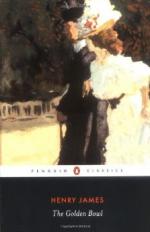There was a morning when, during the hour before luncheon and shortly after the arrival of a neighbourly contingent— neighbourly from ten miles off—whom Mrs. Verver had taken in charge, Maggie paused on the threshold of the gallery through which she had been about to pass, faltered there for the very impression of his face as it met her from an opposite door. Charlotte, half-way down the vista, held together, as if by something almost austere in the grace of her authority, the semi-scared (now that they were there!) knot of her visitors, who, since they had announced themselves by telegram as yearning to inquire and admire, saw themselves restricted to this consistency. Her voice, high and clear and a little hard, reached her husband and her step-daughter while she thus placed beyond doubt her cheerful submission to duty. Her words, addressed to the largest publicity, rang for some minutes through the place, every one as quiet to listen as if it had been a church ablaze with tapers and she were taking her part in some hymn of praise. Fanny Assingham looked rapt in devotion—Fanny Assingham who forsook this other friend as little as she forsook either her host or the Princess or the Prince or the Principino; she supported her, in slow revolutions, in murmurous attestations of presence, at all such times, and Maggie, advancing after a first hesitation, was not to fail of noting her solemn, inscrutable attitude, her eyes attentively lifted, so that she might escape being provoked to betray an impression. She betrayed one, however, as Maggie approached, dropping her gaze to the latter’s level long enough to seem to adventure, marvellously, on a mute appeal. “You understand, don’t you, that if she didn’t do this there would be no knowing what she might do?” This light Mrs. Assingham richly launched while her younger friend, unresistingly moved, became uncertain again, and then, not too much to show it—or, rather, positively to conceal it, and to conceal something more as well—turned short round to one of the windows and awkwardly, pointlessly waited. “The largest of the three pieces has the rare peculiarity that the garlands, looped round it, which, as you see, are the finest possible vieux Saxe, are not of the same origin or period, or even, wonderful as they are, of a taste quite so perfect. They have been put on at a later time, by a process of which there are very few examples, and none so important as this, which is really quite unique—so that, though the whole thing is a little baroque, its value as a specimen is, I believe, almost inestimable.”
So the high voice quavered, aiming truly at effects far over the heads of gaping neighbours; so the speaker, piling it up, sticking at nothing, as less interested judges might have said, seemed to justify the faith with which she was honoured. Maggie meanwhile, at the window, knew the strangest thing to be happening: she had turned suddenly to crying, or was at least on the point of it—the lighted square before




